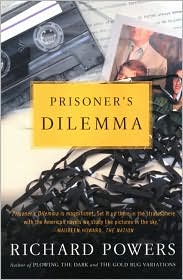Last week, I talked about how the Arthur C. Clarke Award nomination for Generosity confirmed Richard Powers as a science fiction writer. Now, as promised, I want to discuss some ways in which that was obvious all along, if you were looking at his novels from the right angle.
Of course, there’s Galatea 2.2, the 1995 novel about a writer named Richard Powers who spends his year as a “humanist-in-residence” at an Illinois university’s advanced research center “teaching” a computer-based neural network the classics of literature in order to create an artificial intelligence that can “demonstrate acceptable reading comprehension” by writing literary criticism indistinguishable from the human-generated kind. But that seems a little too easy, don’t you think?
Instead, let’s start with the winner of the 2006 National Book Award for Fiction: The Echo Maker.
 The argument for The Echo Maker as science fiction is not as clear-cut as the argument for Generosity was. While both novels are “about” neuroscience and consciousness, The Echo Maker is less “speculative” in the science-fictional sense of the word. A young man named Mark Schluter is pulled out of a wrecked car on a Nebraska highway; his physical recovery is largely complete, but he becomes convinced that his sister, Karin, who has come to help him recuperate, is an impostor—a real disorder called Capgras Syndrome. Desperate for help, she writes to Gerald Weber, a cognitive neurologist and author of bestselling popularizations of brain science, whose encounter with the Schluters coincides with his own emotional crisis. The world they all live in is in no way more scientifically advanced than our own, and even the most technical details about drugs like olanzapine, piracetam, and choline mentioned in the text are, though cutting-edge, grounded in actual research.
The argument for The Echo Maker as science fiction is not as clear-cut as the argument for Generosity was. While both novels are “about” neuroscience and consciousness, The Echo Maker is less “speculative” in the science-fictional sense of the word. A young man named Mark Schluter is pulled out of a wrecked car on a Nebraska highway; his physical recovery is largely complete, but he becomes convinced that his sister, Karin, who has come to help him recuperate, is an impostor—a real disorder called Capgras Syndrome. Desperate for help, she writes to Gerald Weber, a cognitive neurologist and author of bestselling popularizations of brain science, whose encounter with the Schluters coincides with his own emotional crisis. The world they all live in is in no way more scientifically advanced than our own, and even the most technical details about drugs like olanzapine, piracetam, and choline mentioned in the text are, though cutting-edge, grounded in actual research.
But there’s a moment early in Weber’s first encounter with the Schluters, when he reflects that:
…[he] chanced to be working at the precise moment when the race was making its first real headway into the basic riddle of conscious existence: How does the brain erect a mind, and how does the mind erect everything else? Do we have free will? What is the self, and where are the neurological correlates of consciousness? Questions that had been embarrassingly speculative since the beginnings of awareness were now on the verge of empirical answer.
“Master the neural assemblage,” the narrator suggests, “and we might at long last master us”—a sentiment readers of Generosity will instantly recognize. (In fact, you might say that Generosity is the book that goes on to explore the ramifications of that line.) And there’s another scene, much later, when Mark—still convinced that unknown conspiratorial forces have sent a fake Karin to monitor him, and now increasingly convinced that his own home is a simulacra—asks Weber if it’s possible that the last several months of his life have been a virtual reality impressed upon his mind. “That would go a long way towards explaining why I feel like I’ve been living in a video game,” he reasons. “One where I can’t beat the level and advance to the next.”
When I read that scene, I was reminded of the moment in Philip K. Dick’s The Divine Invasion where Herb Asher argues with the police officer about whether or not he’s in cryogenic suspension. And the more I think about it, though there are other parallels I could draw upon—especially the Connie Willis of Lincoln’s Dreams and Passage—Dick’s preoccupation with the nature of reality, and our experience of it, feels most strongly like a model for the type of science fiction Richard Powers writes, at least thematically speaking.
 The bravado with which Mark Schluter faces a world that seems profoundly wrong to him also makes me think of Eddie Hobson, the protagonist of Powers’ second novel, Prisoner’s Dilemma (1988). Eddie has suffered from bizarre fainting spells for years but consistently refuses medical treatment, frustrating his wife and his four adult children—and when he is healthy, he subjects his two sons and two daughters to a constant free associative barrage of trivia and wordplay.
The bravado with which Mark Schluter faces a world that seems profoundly wrong to him also makes me think of Eddie Hobson, the protagonist of Powers’ second novel, Prisoner’s Dilemma (1988). Eddie has suffered from bizarre fainting spells for years but consistently refuses medical treatment, frustrating his wife and his four adult children—and when he is healthy, he subjects his two sons and two daughters to a constant free associative barrage of trivia and wordplay.
We learn fairly early on that Eddie spends a lot of time alone working on a project the family knows as “Hobstown,” and at first we get the sense that he’s trying to nostalgically catalog everything that matters from his youth. Over time, however, it becomes clear that Eddie’s trying to REWRITE history. “Somehow, Dad had fixed on the crazy notion that he was caretaker for the entire tribe,” the eldest son realizes. “His story was the attempt to answer the question, unbearable, of how he could go on living while another suffered even the smallest indignity of distrust.” Anguished by the imprisonment of Japanese-Americans during the Second World War, Eddie meticulously details a world where Walt Disney liberates thousands of them to build a movie studio and then recruits Eddie to star in a film of his own life where, with Mickey Mouse as his guardian angel, he can give Americans hope for the future. (“The audience will think they matter, if you believe you do,” Disney tells him as they tour the set. “And if everyone thinks they matter, then they do.”)
Powers also lays groundwork for a neurological explanation for (some of) Eddie’s physical symptoms, referencing an experiment by a Cornell psychiatrist named Harold Wolff where subjects under hypnosis were told that they were about to be branded by a hot poker, then touched with a pencil tip; some suffered swelling or even blisters at the point of contact. Here, too, we see Powers’ fascination with the mind’s role in defining our experience of reality, and the ways we seek to identify and push against the limitations of that experience.
There’s so much more we could tease out of Powers’ novels, but I’ve gone on plenty already. If I haven’t convinced you yet that Powers will hold your science-fictional attention, give Galatea 2.2 or Generosity a try—and if you like those, have fun creating your own path through the rest.
Ron Hogan is the founding curator of Beatrice.com, one of the first websites to focus on books and authors. Lately, he’s been reviewing science fiction and fantasy for Shelf Awareness.










